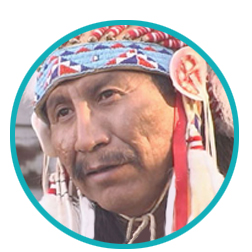Reunification for Healing: First of its kind

 BEMIDJI, Minn. – Later this month there will be a meeting of peoples from the Dakota, Nakota, Lakota, and Ojibwe in Bemidji, Minnesota.
BEMIDJI, Minn. – Later this month there will be a meeting of peoples from the Dakota, Nakota, Lakota, and Ojibwe in Bemidji, Minnesota.
The event is a Reunification for Healing, and it will feature a presentation and prayer from both Dave Courchene, Objiwe, and Arvol Looking Horse, Lakota and keeper of the White Buffalo Calf Pipe. The event will then wrap up with a traditional dinner of roast chicken, wild rice, berries, potatoes, and swamp tea.
The event is sponsored by the Endazhi Manidoowaadak Team, a Bush foundation grant recipient, which is led by Dr. Vivian Delgado, professor of Native American Studies at Bemidji State University. Only around 200 local spiritual leaders, dignitaries, and chairmen have been invited from the Dakota, Nakota, Lakota, and Ojibwe nations to attend the event.
The reunification’s goal is to put the stereotypical traditional colonizer’s enemy theory behind all the peoples involved. Dr. Delgado hopes that hosting a reunification and showing that the nations are more alike than different despite national, state, and reservation boundaries. Delgado thinks that when nations come together and reunite then a stronger and more impactful voice may be heard from the Native Americans all across the continent and globe.
Dr. Delgado not only sees uniting a strong picture to be seen from an outside perspective, but the enemy theory also translates to the tribes themselves. “The only way this is going to work is to start with our native people and put this enemy theory behind us, and as long as we are addressing our own prejudices then we can move onto the white and Indian prejudice,” she said.
In a column in the Bemidji Pioneer, Dr. Delgado wrote “Traditional Enemy Theory: Historically, in the United States, the government has strategically used many colonizing divide and conquer tactics to keep two or more Indigenous nations at odds with each other. Those tactics include written histories, fabricated oral accounts of the same events, treaties, land boundaries, environmental injustices, ignorance’s and traditional enemy theories among Indigenous Nations insinuating that many Nations are still not at peace with the other. This [false history is the foundation behind the] lack of solidarity that prevents the nations from dispelling the inaccuracies that have corrupted many nation to nation relationships.”
Delgado also wrote about how and why reunification is already taking place. She wrote “Many examples of reunification, restoration, and affirmation were seen during the No DAPL consciousness, including other sacred sites protection advocacy. These efforts go beyond political unity to a place or group or territory because it includes the entire environment and the spirit of all that is living in that place. When indigenous people come together to pray for the wellbeing of the land and people you will not find division because awareness/consciousness cannot be divided.”
But reunification, Delgado says, is always a process and can never flow exactly how it is planned. “This has never been done before. We are anxious and we are optimistic. It is more of a process and we need to let it happen however it happens… We are providing the space, drums, and food but we really don’t know how it is going to go,” she said.
The Reunification for Healing is taking place in Bemidji partly because that is where Dr. Delgado resides, but also because it is a border town. The Endazhi Manidoowaadak Team has been conducting round tables about Indian-white relations with city residents like the Sheriff and county attorney. “It is a border town, an Indian/white border town,” she said “you can imagine the hostility.” But Delgado believes that with a reunification of Native Americans in this border town and the continued work of the Endazhi Manidoowaadak Team and organizations like it, Bemidji will see normal race relations within the next 30 years. “Right now we are doing the reunification regardless of what the non-Indian people think,” she said.
“It is the hope that we will see indigenous people coming together more frequently to outwardly display their support for a better day, tomorrow, and future. Reunification is a positive reminder of what Indigenous people already know, the importance of each and every one of us and how we make the world in which we live complete,” she wrote in her column. She believes that all Native Americans and Indigenous peoples globally not only have the potential of replicating the reunification, but also to benefit from it.
Dr. Delgado is the creator of the Native American Studies program at Bemidji State University. She began writing the program in 2012, then it was offered in 2015 and graduated its first graduate in 2016. It is a full 120 credit degree program and is nearly un-paralleled in the country.
Endazhi Manidoowaadak translates to Place Where it is Sacred, and the team is entering their second and final year of their grant cycle. Dr. Delgado hopes to attain more grant monies in the future and continue her work with the team.
(Contact Travis at travisldewes@gmail.com)
